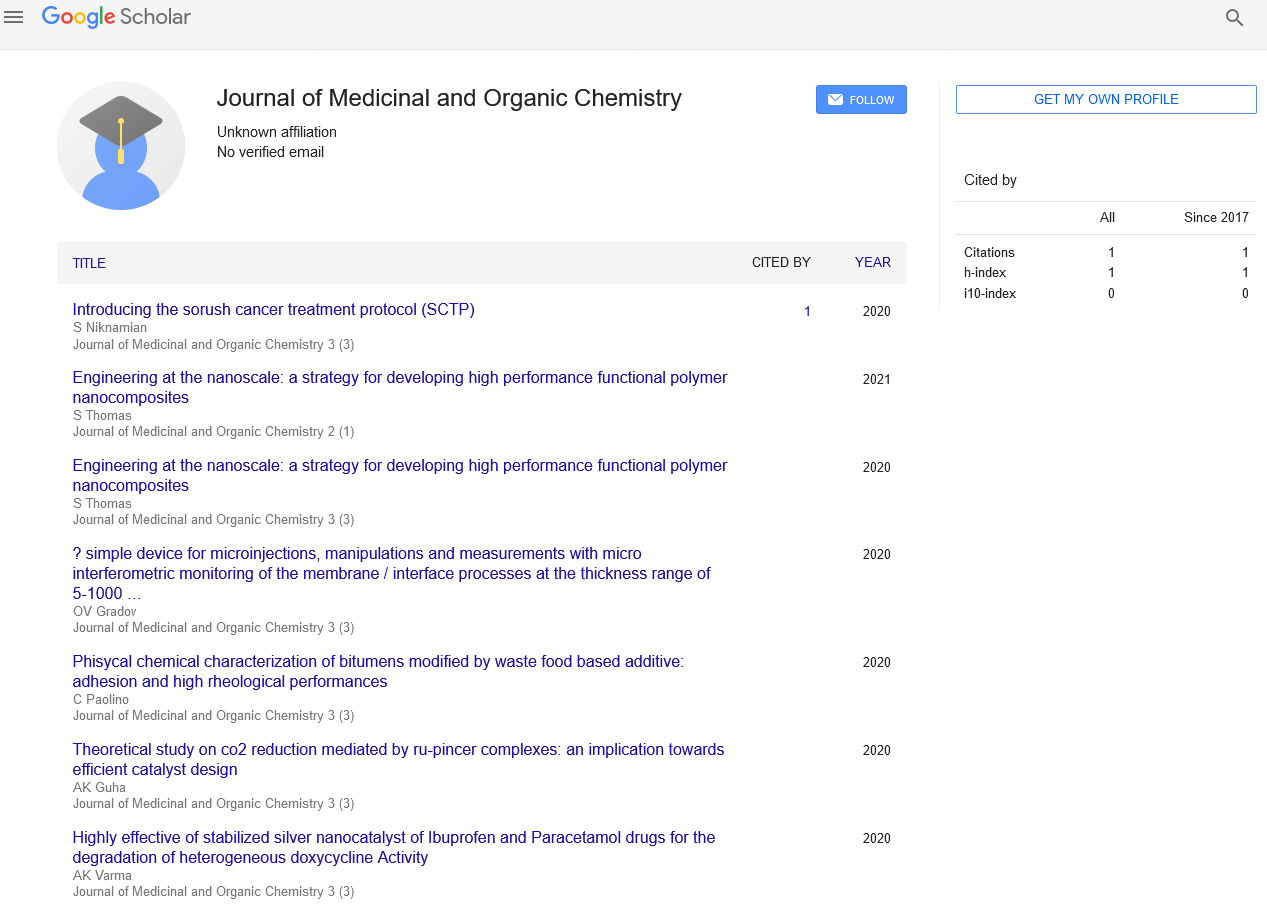Mini Review - Journal of Medicinal and Organic Chemistry (2023) Volume 6, Issue 2
Psychosocial Research their Impact on Human Behavior
Dr. Faiz Alam*
Department of drug Development and drug discovery, University of SRP, Pakistan
Department of drug Development and drug discovery, University of SRP, Pakistan
E-mail: faiz.a@gmail.com
Received: 31-Mar-2023, Manuscript No. jmoc-23-95392; Editor assigned: 03-April-2023, PreQC No. jmoc-23- 95392; Reviewed: 17-April-2023, QC No jmoc-23-95392; Revised: 21-April-2023, Manuscript No. jmoc-23-95392 (R); Published: 28-April-2023; DOI: 10.37532/ jmoc.2023.6(2).22-24
Abstract
Psychosocial research is a field of study that explores the intersection of psychological and social factors in shaping human behavior and well-being. This interdisciplinary approach to understanding human experience involves examining the influence of social, cultural, economic, and political forces on individual and collective psychological functioning. Psychosocial research examines the relationship between the individual and the social context in which they live. It explores how factors such as race, ethnicity, gender, age, class, and sexual orientation affect the way people perceive and interact with the world around them. This research is important because it helps us to better understand the psychological and social mechanisms that underlie individual and group behavior, as well as the ways in which these mechanisms interact to influence health, well-being, and quality of life. Psychosocial research is a field of study that focuses on the relationship between psychological and social factors and their impact on human behavior, emotions, and mental health. This type of research aims to understand the interplay between an individual’s thoughts, feelings, and behaviors, as well as the social and cultural context in which they exist. Psychosocial research has proven to be an effective tool for understanding human behavior and improving mental health outcomes. Psychosocial research is a field of study that investigates the intersection between psychological and social factors, exploring how these two aspects of human experience interact and influence one another. This type of research has led to significant discoveries about human behavior and has had a profound effect on many areas of society.
Keywords
Psychosocial research • Cultural• Economic • Human behavior • Health
Introduction
One area of psychosocial research is social cognition, which involves the study of how people process, store, and use social information. Social cognition researchers explore questions such as: How do people form first impressions of others? How do people make attributions about the causes of behavior? How do people use stereotypes and other forms of social categorization to simplify and understand the social world? By investigating these and other questions, social cognition researchers aim to better understand the ways in which people make sense of and navigate social situations [1]. Another area of psychosocial research is social identity, which involves the study of how people’s sense of self is influenced by their membership in various social groups. Social identity researchers explore questions such as: How do people develop a sense of identity based on their race, gender, or other social categories? How do people negotiate the tension between their individual identity and their group identity? How do people respond to discrimination and prejudice based on their social identity? By investigating these and other questions, social identity researchers aim to better understand the complex interplay between individual and group identity [2]. A third area of psychosocial research is health psychology, which involves the study of how psychological factors influence physical health and illness. Health psychologists explore questions such as: How do stress and other psychological factors influence the development and course of disease? How can psychological interventions such as cognitive-behavioral therapy or relaxation techniques improve health outcomes? How do social factors such as social support or access to healthcare influence health behaviors and outcomes? By investigating these and other questions, health psychologists aim to better understand the complex interplay between psychological and physical well-being. One of the key strengths of psychosocial research is its ability to integrate multiple disciplines and perspectives [2]. Psychosocial research draws on psychology, sociology, anthropology, and other fields to develop a comprehensive understanding of human behavior. By combining different perspectives, researchers can explore the complex interplay between individual factors, such as personality and cognition, and external factors, such as social and cultural influences. Strength of psychosocial research is its focus on realworld outcomes. Psychosocial research aims to identify practical solutions to complex social and psychological problems [3]. For example, researchers may investigate the effectiveness of different types of psychotherapy or interventions to improve mental health outcomes. By focusing on practical outcomes, psychosocial research can have a tangible impact on people’s lives [4].
One area where psychosocial research has proven particularly effective is in the treatment of mental health disorders. Studies have shown that psychotherapy, which is a type of psychosocial intervention, can be an effective treatment for a range of mental health disorders, including depression, anxiety, and PTSD. Cognitive-behavioral therapy (CBT) is one of the most commonly used types of psychotherapy and has been shown to be effective in reducing symptoms of depression and anxiety [5]. Psychosocial research has also been used to improve outcomes in other areas, such as education and social policy. For example, researchers have investigated the impact of different types of classroom environments on student learning outcomes. They have also studied the effectiveness of social policies aimed at reducing poverty and inequality. Despite its much strength, psychosocial research also has some limitations. One limitation is that it can be challenging to study complex social and psychological phenomena in a controlled experimental setting [6]. Additionally, psychosocial research often relies on self-report measures, which can be subject to biases and inaccuracies.
One of the key areas where psychosocial research has had an impact is in the field of mental health. By examining the complex interplay between psychological factors such as individual beliefs, emotions, and behaviors, and social factors such as family, community, and cultural influences, researchers have gained a deeper understanding of the causes and effects of mental illness [7]. This understanding has informed the development of new treatment approaches and interventions that aim to address both individual and societal factors that contribute to mental health problems. For example; psychosocial research has shown that social support is a critical factor in preventing and treating mental illness. Studies have found that individuals with strong social networks, including close relationships with family and friends, are less likely to develop mental health problems and are more likely to recover from them when they do occur. This finding has led to the development of social support interventions that aim to help individuals build and maintain these important relationships [8]. Psychosocial research has also had an impact on the field of education. By examining the ways in which social and psychological factors influence learning, researchers have developed new approaches to teaching and learning that take into account the importance of social and emotional development. For example, studies have found that children who feel connected to their teachers and classmates are more likely to be engaged in learning and to achieve academic success. This understanding has led to the development of programs that focus on building positive relationships between students and teachers, and creating supportive classroom environments that promote social and emotional development [9].
In addition to mental health and education, psychosocial research has had an impact on a wide range of areas, including public health, criminal justice, and social policy. For example, researchers have used psychosocial research to understand the factors that contribute to drug addiction and to develop effective prevention and treatment strategies. They have also examined the impact of social policies such as welfare reform and immigration policies on individual and family well-being [10].
Conclusion
Psychosocial research is an interdisciplinary field that explores the relationship between psychological and social factors in shaping human behavior and well-being. Through the study of social cognition, social identity, and health psychology, psychosocial researchers aim to better understand the complex interplay between individual and social factors in shaping human experience. Psychosocial research is an effective tool for understanding human behavior and improving mental health outcomes. By integrating multiple disciplines and perspectives, psychosocial research provides a comprehensive understanding of the complex interplay between individual and social factors. Its focus on practical outcomes also makes it a valuable tool for developing solutions to real-world problems. While psychosocial research has some limitations, its much strength makes it an essential field of study for improving human well-being. This research is important because it can help us to better understand the mechanisms underlying behavior and to develop interventions that can improve the health and well-being of individuals and communities. Psychosocial research has had a profound effect on many areas of society. By shedding light on the complex interplay between psychological and social factors, researchers have gained a deeper understanding of human behavior and have developed new approaches to addressing a wide range of problems. As our understanding of these factors continues to grow, we can expect to see even more significant advances in the years to come.
References
- Carrillo JE, Carrillo VA, Perez HR et al. Defining and targeting health care access barriers. J Health Care Poor Underserved. 22, 562-75 (2011).
- Lewis RJ, Dutertre S, Vetter I et al. Conus venom peptide pharmacology. Pharmacological Reviews. 64, 259-98 (2012).
- Kobayashi H, Airway biofilms: implications for pathogenesis and therapy of respiratory tract infections. Respiratory medicine. 4, 241-253 (2005).
- Huang ES, Brown SE, Ewigman BG et al. Patient perceptions of quality of life with diabetes-related complications and treatments. Diabetes Care. 30, 2478-2483 (2007).
- Buehler AM, Cavalcanti AB, Berwanger O et al. Effect of tight blood glucose control versus conventional control in patients with type 2 diabetes mellitus: a systematic review with meta-analysis of randomized controlled trials. Cardiovascular Therapeutics. 31,147-160(2013).
- Pratley RE, Rosenstock J, Pi-Sunyer FX et al. Management of type 2 diabetes in treatment-naive elderly patients: benefits and risks of vildagliptin monotherapy. Diabetes Care. 30, 3017-3022 (2007).
- Makam AN, Nguyen OK. An Evidence-Based Medicine Approach to Antihyperglycemic Therapy in Diabetes Mellitus to Overcome Overtreatment. Circulation. 135, 180-195 (2017).
- Qaseem A, Vijan S, Snow V et al. Glycaemic control and type 2 diabetes mellitus: the optimal haemoglobin A1C targets, a guidance statement from the American College of Physicians. Annals of Internal Medicine. 147: 417-422 (2007).
- Bick David, Bick Sarah L, Dimmock David P et al. An online compendium of treatable genetic disorders. American Journal of Medical Genetics. Part C Seminars in Medical Genetics. 187, 48-54 (2021).
- Amori RE, Lau J, Pittas AG et al. Efficacy and safety of incretin therapy in type 2 diabetes: systematic review and meta-analysis. JAMA. 298, 194-206 (2007).
Indexed at, Google Scholar, Crossref
Indexed at, Google Scholar, Crossref
Indexed at, Google Scholar, Crossref
Indexed at, Google Scholar, Crossref
Indexed at, Google Scholar, Crossref
Indexed at, Google Scholar, Crossref
Indexed at, Google Scholar, Crossref
Indexed at, Google Scholar, Crossref
Indexed at, Google Scholar, Crossref

